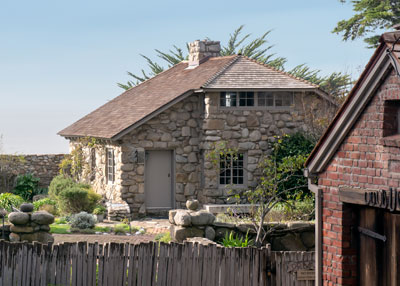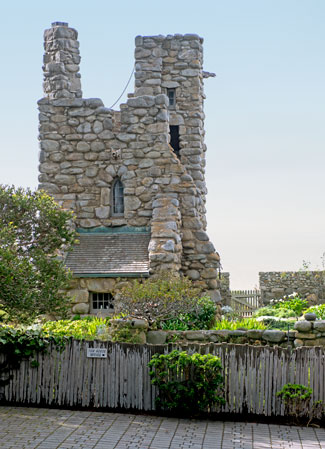National Register of Historic Places in Monterey County
Tor House
AKA Robinson Jeffers House
26304 Ocean View Avenue
Carmel
Robinson Jeffers was born in 1887 in Pittsburgh. As a boy, he was trained in the Bible and classical languages. The Jeffers family frequently traveled to Europe. While in college, Jeffers studied studied literature, medicine and forestry. He graduated from Presbyterian Occidental College at age eighteen.
In 1913, he married Una Call Kuster and they moved to Carmel where they lived for the rest of their lives, building the stone Tor House and Hawk Tower, both of which figure prominently in his work. It was at the beginning of his time in Carmel that Jeffers turned exclusively to writing poetry.
In 1918, Jeffers began building the Tor House after an apprenticeship with a Carmel stonemason. The granite stones were drawn by horses from the little cove below the house. "Tor" is Welsh for hill or a large, free-standing rock outcrop. Construction was completed in 1919. Oil lamps and candles provided illumination until electricity was installed in 1949.
Embedded in the walls of Tor House are hundreds of small stones, bits of ceramic and other sovenirs from the British Isles, Angkor Wat, Babylon, Rome, Pompeii, Delos, China, Egypt and MesoAmerica.
In 1920, Jeffers began building Hawk Tower as a retreat for his wife and a magic place for his sons. Jeffers built the tower entirely by himself using wooden planks and a block and tackle to move the stones and to set them in place. It was completed in less than four years,
Jeffers said his interests included "stone masonry, tree planting, swimming, pipe smoking, drives and walks in the Coast Range, reverent admiration of hawks, herons and pelicans."
Jeffers died in 1962.

Jeffers uncompromising work celebrates the enduring beauty of sea, sky and stone and the freedom and ferocity of wild animals, and strives to create a vision of a world in which human experience is questioned, qualified and decentered. Jeffers’ poetry shifts “emphasis and significance from man to not-man.”
Because humanity had been spurned by an uncaring God, each individual should rid himself of emotion and embrace an indifferent, nonhuman god. To develop his philosophy of "inhumanism,"" Jeffers drew on his extensive reading in philosophy, religion, mythology and science. Critics have connected Jeffers’s ideas to those of Schopenhauer, Nietzsche and Lucretius.
Source: Adapted from Poetry Foundation

Hurt Hawks
I
The broken pillar of the wing jags from the clotted shoulder,
The wing trails like a banner in defeat,
No more to use the sky forever but live with famine
And pain a few days: cat nor coyote
Will shorten the week of waiting for death, there is game without talons.
He stands under the oak-bush and waits
The lame feet of salvation; at night he remembers freedom
And flies in a dream, the dawns ruin it.
He is strong and pain is worse to the strong, incapacity is worse.
The curs of the day come and torment him
At distance, no one but death the redeemer will humble that head,
The intrepid readiness, the terrible eyes.
The wild God of the world is sometimes merciful to those
That ask mercy, not often to the arrogant.
You do not know him, you communal people, or you have forgotten him;
Intemperate and savage, the hawk remembers him;
Beautiful and wild, the hawks, and men that are dying, remember him.
II
I'd sooner, except the penalties, kill a man than a hawk;
but the great redtail
Had nothing left but unable misery
From the bone too shattered for mending, the wing that trailed under his talons when he moved.
We had fed him six weeks, I gave him freedom,
He wandered over the foreland hill and returned in the evening, asking for death,
Not like a beggar, still eyed with the old
Implacable arrogance.
I gave him the lead gift in the twilight.
What fell was relaxed, Owl-downy, soft feminine feathers; but what
Soared: the fierce rush: the night-herons by the flooded river cried fear at its rising
Before it was quite unsheathed from reality.
Robinson Jeffers

